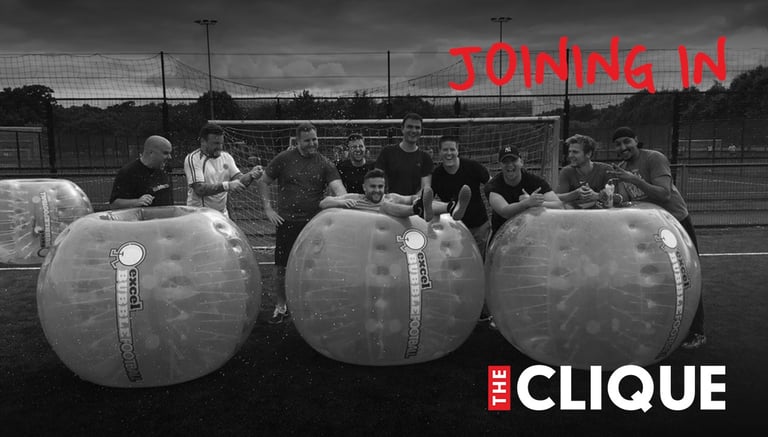Joining In > Leading


// Theo Walcott
Back in 2006, Theo Walcott was a fresh faced youth player who had just signed for Arsenal from Southampton and was yet to make his first team debut for the Gunners.
Theo Walcott was Southamptons youngest ever player at the time of his debut and he became their youngest ever goalscorer just two months later when he scored in a 2-1 defeat to Leeds.
The craziest thing then happened - he was called up by Sven Goran Eriksson to represent England in the 2006 World Cup. I know, 2006 is a long time ago but it’s the one where we got to the quarter finals and we went out to Portugal and Wayne Rooney got that red card and Cristiano Ronaldo winked at the Portugal bench.
But anyway, back to Theo Walcott.
He was called up and there was a huge deal made about the fact that he still hadn’t played for Arsenal in the Premier League but Sven made the point that Theo could be a ‘wild card’ for England and that it would “do him good to join in”.
The exposure to being a part of the team would do him good and it would mean that he had that experience at future World Cups and England would be better for it.
It didn’t really work out that way for Theo - he did go on to earn 47 caps for England but even he admits that his first call up was too soon.
But.. the point is, Sven wanted him to join in because it means something to be a part of it.
Sure, he could have left Theo Walcott at home and taken an extra centre back but he had an eye on the future and I think we all should have one eye on the future.
// Leading is hard.
Following on from last weeks article about leadership, I think we could all agree that leadership in any form is hard.
Theo Walcott never did captain England (the pinnacle of leading in a football team I suppose) - he did get the captains armband once at Arsenal to commemorate his 10 years at the club but he wasn’t a typical leader.
He was a team player though and throughout his career, we can say that he contributed to his team through his runs, goals and assists - all starting at the top level with that inclusion in the England squad.
The fact that he didn’t play in that first World Cup astounded me at the time because surely you pick a team based on the players you’re going to play instead of those who need the experience. But then again, do we?
Kids at school are often told that it’s the ‘taking part that counts’ and whilst I hate that phrase, it does have an element of truth in it.
We can’t all be the captain, we can’t all score the goals and we can’t all be the goalkeeper - it’s just not possible. To be a team, you need the players to step up and do the jobs that you don’t want to do - its an all round game.
My son would tell you different as when he’s playing for his Sunday league team, he is the captain, the penalty taker, the one who takes the throw ins and the corner taker - he wants to do it all.
Taking part isn’t something that we should all be afraid of - we should embrace it to enhance the experience for everyone else.
// Being there.
The collective experience of being with other people and joining in is something which has been proven to alleviate mental health problems, it unlocks things in the brain and has been used as a way to treat depression and anxiety - being around people, experiencing the same things at them and then sharing those experiences all go some way to elevating the happy hormones in our bodies because we’re tribal and our worlds were not designed to be about the individual.
When you step up to lead something, you bare a responsibility to take people on a journey and show them the way - this can be crippling for most as it’s difficult to deal with the self doubt, the uncertainty about the direction you want to take something and the burden of actually doing it.
When you join in with someone else, things happen. You begin to support another in their journey and you become part of something as a collective.
// Learning Opportunity
Joining in allows you to learn from others who may have more experience or expertise in an activity or project.
By being there as a team member, you have the chance to observe different leadership styles, problem-solving techniques, and strategies for achieving goals - this can be invaluable as you may want to do something similar in the future.
I toy with the idea of running an event for The Clique in the future - a place where we can celebrate what it means to create content that means something to those who want to take risks in creating. But I wouldn’t know where to start and the whole concept of failure around arranging such an event actually scares me.
I know failure is a part of doing something for the first time but I’m so early on in this journey that I dare not take that initial leap by myself first.
When I align myself with others who are running events and I attend events myself, I am exposing myself to the areas where I lack knowledge and it slowly, over time, builds my confidence.
// Networking and Relationship Building
The bride and groom at a wedding will tell you that they barely remember their wedding day and it all goes by in a blur but their guests will tell you about those small little memories which they can take away from the day.
The reason being, the bride and groom are running the show - they are the centre of attention and they are being pulled from one end of the day to the other with very little downtime in between.
The guests however, all have time to congregate, chatter about the dress and network.
The same happens when you join in with something instead of leading it - you have the time and space to build relationships with others around you.
Being part of a team allows you to build relationships and network with others who share similar interests or goals.
These connections can be valuable for future collaborations, career opportunities, and personal growth and it means you don’t have to be the bride/groom at a wedding!


